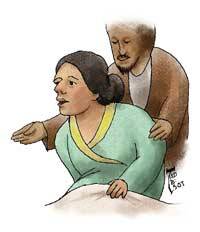On Fire With the Good News
What often makes the difference between experiencing life as endless drudgery and utter misery and being alive with energy and joy is our state of health—physical, emotional or spiritual. Illness and other profound losses color the whole of our perception. When an illness persists, whether one’s own or a loved one’s, one can empathize with Job’s feeling of utter weariness. It sounds familiar. A sense of helplessness, of not being in control makes one feel like a slave, who has to answer to another. One longs for relief but has no respite day or night. It seems as if a breath of wind could carry away forever the fragile self; there is no hope of happiness ever again (Jb 7:1-4).
From such a place of pain we believers, like Job, pour out our hearts to God, knowing that God never sends or wants suffering for anyone. Whether or not the healing we desire comes in the form we want, God is always with us, binding up our wounds and mending our broken-heartedness (Ps 147:3). In the Gospels, it is Jesus who embodies the power to repair shattered minds, bodies and spirits. Regardless of what stands in the way of our being able to receive and share the good news, Jesus binds up or casts out, thus releasing the power within us to experience and pass on God’s love.
That is what happens with Simon’s mother-in-law. Ablaze with fever, she lacks her usual energy for service to others. In much the same way that Jesus calls her son-in-law to become a disciple, Jesus approaches her and frees her from all that impedes her from responding to the good news. Just as Simon Peter leaves behind his net so that he can “fish for people” (Mk 1:17), so his mother-in-law, holding on to Jesus’ hand as the fever leaves her, takes up her own ministry.
The verb die_konei, usually translated as “served” or “waited on” (Mk 1:31), not only refers to serving dinner, but also to a wide range of ministries, including ministries of the word and of the table (Acts 6:1-6), and service that is apostolic (Acts 1:25), financial (Lk 8:3; Acts 1:29) and administrative (Rom 16:1). Although this Scripture passage does not tell us in what forms of service she engaged, the early believers remembered not only how Jesus extinguished the fiery fever of Simon’s mother-in-law, but also how from her love ablaze she ministered to and with them.
When Jesus heals people, he does not simply restore them to a former state of well-being. Rather, physical healings are outer signs of a deeper transformation of body, mind and spirit. As many people who have had a near-death experience attest, nothing is ever the same afterward. Similarly, Simon’s mother-in-law experiences a “resurrection.” The verb geiren, “lifted up” (Mk 1:31), is the same word used for Jesus’ resurrection. A new life has been given her, but not for her only. As with all disciples, it is a transformed life that is to be shared in service.
Jesus’ purpose includes not only healing, but also preaching (Mk 1:38-39). He frees people from whatever binds them so that they can join him in proclaiming the transforming power of God’s love. His preaching encompasses not only a personal release from illness, but also the systemic evils from which people must be set free. Paul says that there is not really any choice in the matter. When one has experienced God’s gracious healing love, one is obliged to tell of it. In whatever circumstances we find ourselves, we are to preach God’s love. We do this according to our own gifts and calling.
Paul also speaks of how important it is for preachers to adopt the language, images and symbols of the people to and with whom they are ministering. A person on fire with the good news does not use abstract concepts, but tells how divine mercy raises us from the depths of misery, already transforming our sufferings, and leads us forward to the day of complete joy in God’s everlasting embrace.
This article also appeared in print, under the headline “On Fire With the Good News,” in the February 2, 2009, issue.








